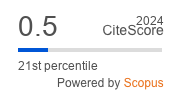«Health schools» as the key factor of efficient cardiovascular disease prevention
Abstract
In the Russian Federation, cardiovascular diseases (CVD) accounts for about 57% of adult mortality. The aim of the study was to evaluate the CVD prevention effectiveness in the patients attending «Schools of Health» at Health Centers in Tula and the Tula region. The study analyzed the major risk factors in arterial hypertension (AH) patients in «Schools of Health» in 2014. The study findings suggest that the priority AH risk factors were increased body mass index, elevated total cholesterol level and low physical activity. The study demonstrated that education programs fo AH patients at «Schools of Health» in Tula and the Tula region can not only inform the raise public awareness about the disease, the AH key risk factors, a modern drug and non-drug AH therapy, but also improve patients' quality of life, prevent AH progression and reduce the risk of serious complications (e.g., stroke, myocardial infarction, etc.) which may result in disability and mortality in patients.
About the Authors
N. V. EkkertRussian Federation
Natalia V. Ekkert - Doctor of Medical Science, Professor with N.A. Semashko Department of Public Health and Health Care, the Faculty of Preventive Medicine, I.M. Sechenov First Moscow State Medical University.
8/2, Trubetskaya str., Moscow, 119991
Tel.: +7 (499) 248-30-33
V. V. Mikhaylovski
Russian Federation
Assistant with N.A. Semashko Department of Public Health and Health Care, the Faculty of Preventive Medicine, I.M. Sechenov First Moscow State Medical University.
8/2, Trubetskaya str., Moscow, 119991
References
1. The reports at XII Russian Congress «Arterial hypertension 2016: results and prospects» (Russia, Moscow, March 23–25, 2016). Moscow; 2016; 65 (in Russian).
2. Chazova I.E. Prevalence of cardiovascular risk factors in arterial hypertension patients population in Russia. Cardiology. 2014; 10: 4–12 (in Russian).
3. Lazutkina A.Yu. Prognostic value of risk factors for cardiovascular diseases and target organ damages for the development of resistant hypertension. Therapeutic archive: Scientific-practical J. 2015; 4: 19–23 (in Russian).
4. Croshnin S.M., Ivanova E.S., Ovcharenko M.I., Shalagin Y.D. Coordination of medical prevention service and Health Centers activities (experience of the Moscow region). Chief Med. Officer. 2012; 5: 38–41 (in Russian).
5. Shilov A.M., Melnik M.V., Hosea A.O., Dulaeva M.S. Correction of risk factors in obese patients with arterial hypertension. Sechenovsky Vestnik. 2010; 2 (2): 34–42 (in Russian).
6. Oganov R.G. (ed.). School of health. Hypertension. A guide for physicians. Moscow: GEOTAR-Media; 2008: 192 (in Russian).
7. Federal law of 21.11.2011 № 323-FZ (ed. from 03.07.2016) «About bases of health protection of citizens in the Russian Federation» (in Russian).
8. Kucherenko V.Z. (ed.). Selected lectures on public health and healthcare: the textbook. Moscow: Medicine; 2010: 464 (in Russian).






































